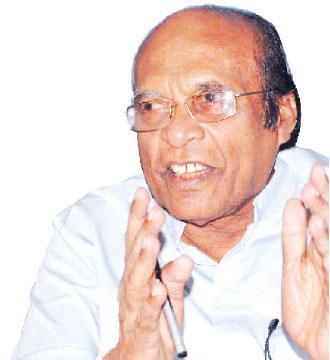
General Secretary of the Sri Lanka Communist Party and former Cabinet Minister D.E.W. Gunasekera said if the UNP asserts that Prime Minister Mahinda Rajapaksa does not have a majority, former Prime Minister Ranil Wickremesinghe too has a problem. Although the JVP and the TNA agreed to remove Prime Minister Mahinda Rajapakse from his portfolio, they had never given an undertaking to appoint Ranil Wickremesinghe as the Prime Minister.Ranil Wickremesinghe has the support of only a group of one-hundred people and as such he could never take his oaths as Prime Minister, he said.
Gunasekara said that although Ranil Wickremesinghe became the Prime Minister, he did not have any power, with only 46 MPs while his rivals held a 2/3 majority.
Until the dissolution of Parliament, the SLFP voted for every issue which Ranil Wickremesinghe has forgotten today. He succeeded in getting the consent of the SLFP solely because Mahinda Rajapaksa had handed over the SLFP Chairmanship to President Maithripala Sirisena.The Speaker, who observed the dignity of the Speaker’s Chair and the House in the breach, is responsible for the chaotic situation, he said.
According to parliamentary traditions if Prime Minister Mahinda Rajapaksa was defeated by the No-Confidence Motion, he should quit. The Speaker acted in a hurry probably on an ‘order’ from Temple Trees.
The Speaker and all others wanted to internationalise the issue and that is why he had summoned foreign Ambassadors to Parliament.He further said that President Maithripala Sirisena took three bold decisions - Appointment of a new Prime Minister, Proroguing Parliament and Dissolution of Parliament to resolve the policy difference with the then Prime Minister Ranil Wickremesinghe.
However, it was with the intervention of the President himself, that the differences could be ironed out.Both the 19th and the 20th Amendments aimed at transforming the Executive Presidency into a parliamentary system, but that never saw the light of day.
Ours is a unique situation, where the President is the Head of State, head of government, head of Cabinet and Commander of the Forces, and it is still in force.
In the current political imbroglio, the Supreme Court will be the final arbiter.I worked with almost ten Parliamentary Speakers, and have studied their decisions in parliamentary history. The Speaker in his first Media Release accepted the new Prime Minister and a seat in Parliament was accorded to him.
Former Parliamentary Secretary General Nihal Seneviratne reminded me of an incident in Parliament during R Premadasa’s presidency and underscored the need to stick to Standing Orders.
